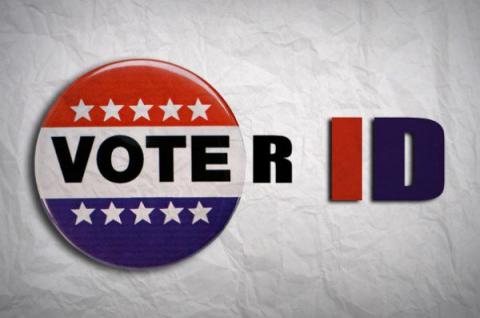A federal court on Thursday upheld the U.S. Department of Justice’s decision to block a Texas voter ID law passed by the 82nd Texas Legislature. This is the second time in less than a week a three-judge panel ruled against state lawmakers and found the state of Texas in violation of Section 5 of the Voting Rights Act of 1965.
The DOJ denied Texas preclearance for Senate Bill (SB) 14 back in March. The Obama administration argued that the law intentionally discriminates against certain demographics of the voting age population that have difficulty obtaining the specific types of ID required under SB 14. The voters they argued would be affected by the law the most are members of minority groups, elderly citizens, and the poor.
SB 14 was passed during the 2011 Texas legislative session by a legislature with a GOP super-majority.
Republican lawmakers argue that they pushed for the bill because the people of Texas wanted better preventive measures against voter fraud. Requiring voters to show ID before they cast their ballot, advocates of the law argue, would help preserve the integrity of the state’s electoral system and crack down on in-person voter fraud.
Attorneys for the DOJ called several Texas Democratic lawmakers as witnesses. They argued that Republicans in the state legislature were motivated by an intentional desire to racially discriminate against Hispanic and black voters who tend to vote for Democratic candidates.
In 2008, the country saw an exceptional year in voter turnout. There were a number of demographics within the voting age population that had record showings at the polls, including minority groups. It was around this time that a mostly partisan driven agenda within the Republican Party became a serious focus in states with GOP-controlled legislative and executive branches to enact strict laws that require specific forms of ID at polling locations.
The justice department focused specifically on the law’s effects on the Hispanic population, a demographic that cannot be easily ignored in a state like Texas.
The 2010 U.S. Census showed that roughly 38% of the state’s population is of Hispanic and Latino origin. This number has likely increased in the last two years to some degree since the population is also the fastest growing in Texas. The DOJ heavily emphasized how a voter ID law as strict as SB 14 would disenfranchise many eligible voters within this segment of the population and therefore was a clear violation of the Voting Rights Act.
The U.S. District Court in Washington ruled in the justice department’s favor. The three federal judges that heard the case unanimously agreed that Texas did not comply with the Voting Rights Act when implementing SB 14. The burden was on state lawyers to show the court that the purpose of the law was solely to prevent voter fraud and that it didn’t infringe on the rights of voters to elect candidates that best represent them.
“We find that Texas has failed to make this showing—in fact, record evidence demonstrates that, if implemented, SB 14 will likely have a retrogressive effect. Given this, we have no need to consider whether Texas has satisfied section 5’s purpose element. Accordingly we deny the state’s request for a declaratory judgment.”
Each judge was appointed by a different president. Just as it was with the Texas redistricting case, at least one of these judges, Rosemary Collyer, was appointed by former President George W. Bush. Robert Wilkins was appointed by President Barack Obama. David Tatel, a Clinton appointee, wrote the 56-page opinion for the panel. In it, Judge Tatel wrote that SB 14 was “the most stringent in the nation.”
“That law will almost certainly have retrogressive effect,” the court noted. “It imposes strict, unforgiving burdens on the poor, and racial minorities in Texas are disproportionately likely to live in poverty.”
The court pointed out that Texas would have had a much better case if the Texas Legislature included amendments that would have waived fees for the less fortunate and low-income earners who would struggle to obtain the necessary documents to acquire an ID to vote. The judges concurred that the decision would have been much closer if state lawmakers had broadened the range of acceptable photo identification to present at the ballot box.
Texas Attorney General Greg Abbott was, once again, quick to promise appeal. He said he is confident the U.S. Supreme Court will overturn the district court’s ruling.
"The Supreme Court of the United States has already upheld Voter ID laws as a constitutional method of ensuring integrity at the ballot box. Today's decision is wrong on the law and improperly prevents Texas from implementing the same type of ballot integrity safeguards that are employed by Georgia and Indiana - and were upheld by the Supreme Court. The State will appeal this decision to the U.S. Supreme Court, where we are confident we will prevail."
Governor Perry remarked in a statement Thursday afternoon that the ruling was a “victory for fraud.”
However, a big problem Texas lawmakers and attorneys ran into during the hearing was that they could not provide one legitimate case of in-person voter fraud in Texas to build the foundation of their case on. In fact, research studies released across the country highlight the fact that cases of in-person voter fraud are infinitesimally small compared to other types of voter fraud like absentee ballot fraud and voter registration fraud.
“There are more UFO and Bigfoot sightings than documented cases of voter impersonation,” state Senator Rodney Ellis (D-Houston) said. “After years of testimony and debate, supporters of the Texas voter ID law still cannot prove their case that voter impersonation is even a minor problem in Texas.”
Neither the redistricting case nor the voter ID issue will likely to be settled by the general election on November 6. The Supreme Court is not scheduled to reconvene until October.
